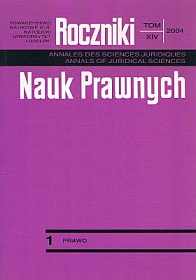Justice and Porposefulness in Law
Abstract
In the article an attempt is undertaken at defining mutual relations of justice and purposefulness, as the values that form the idea of law. The conception of the idea of law was worked out mainly by the German philosophy of law, and especially by G. Radbruch and A. Kaufmann.
In the idea of law G. Radbruch distinguished three elements: justice, purposefulness and reliability of law. Justice is a formal principle whose essence is equality. It just defines the form of law, requiring that the equal should be treated equally and the unequal differently in an adequate way. To complement this principle purposefulness is necessary, which is a material principle defining the contents of law. However, since it is connected with relativism and controversies may originate of the political-worldview nature concerning the contents of law, also the principle of reliability of law is necessary that can put an end to these controversies and bring about legal peace, securing the binding force for the positive law. Between these three elements of the idea of law, according to Radbuch, there is a relation of mutual exclusion.
A. Kaufmann developed the theory of the idea of law. His point of departure was the fact that as equality is the essence of justice, then equality itself is not the whole of justice. There are other tendencies beside it, namely, purposefulness and security of law. He identified the idea of law with a broadly understood justice that may be considered in three aspects: in the aspect of justice as equality, in the aspect of justice as purposefulness and in the aspect of justice as a factor giving security of law.
References
Arystoteles: Etyka nikomachejska, [w:] A. Kość (red.), Filozofia prawa. Wybór tekstów źródłowych, Lublin 2002, s. 55-67.
Böckenförde E. W.: Prawo i wartości, [w:] tenże, Wolność – Państwo – Kościół, Kraków 1994.
Dutkiewicz P.: Problem aksjologicznych podstaw prawa we współczesnej polskiej filozofii i teorii prawa, Kraków 1996.
Geiger T.: Vorstudien zu einer Soziologie des Recht, Tübingen 1947.
Hartmann N.: Ethik, München 1962.
Jarra E.: Ogólna teoria prawa, wyd. 2, Warszawa 1922.
Jhering R. von: Der Zweck im Recht, wyd. 5, Berlin 1916.
Kaufmann A.: Rechtsphilosophie, wyd. 2, München 1997.
Kelsen H.: Was ist Gerechtigkeit?, „Studia Philosophica”, 13(1953), s. ***.
Kelsen H.: Was ist Gerechtigkeit?, wyd. 2, Wien 1975.
Kość A.: Podstawy filozofii prawa, Lublin 1998. Wyd. 2 – Lublin 2001.
Kość A. (red.): Filozofia prawa. Wybór tekstów źródłowych, Lublin 2002.
Najder Z.: Wartości i oceny, Warszawa 1971.
Piechowiak M.: W poszukiwaniu ontologicznych podstaw prawa. Arthura Kaufmanna teoria sprawiedliwości, Warszawa–Poznań 1992.
Radbruch G.: Literaturbericht Rechtsphilosophie [1907], [w:] tenże, Gesamtausgabe. Rechtsphilosophie, t. I, Heidelberg 1987.
Radbruch G.: Rechtsphilosophie [1932], [w:] tenże, Gesamtausgabe. Rechtsphilosophie, t.II, Heidelberg 1993.
Radbruch G.: Vorschule der Rechtsphilosophie [1948], [w:] tenże, Gesamtausgabe. Rechtsphilosophie, t. III, Heidelberg 1990.
Scheler M.: Der Formalismus in der Ethik und die materiale Wertethik, Bern 1954.
Szyszkowska M.: Filozoficzne interpretacje prawa, Warszawa 1999.
Tomasz z Akwinu: Suma teologiczna. Zagadnienie 58: O sprawiedliwości, [w:] A. Kość (red.), Filozofia prawa. Wybór tekstów źródłowych, Lublin 2002, s. 112-120.
Tomasz z Akwinu: Suma teologiczna. Zagadnienie 90: O istocie prawa, [w:] A. Kość (red.), Filozofia prawa. Wybór tekstów źródłowych, Lublin 2002, s. 93-94.
Copyright (c) 2004 Roczniki Nauk Prawnych

This work is licensed under a Creative Commons Attribution-NonCommercial-NoDerivatives 4.0 International License.


